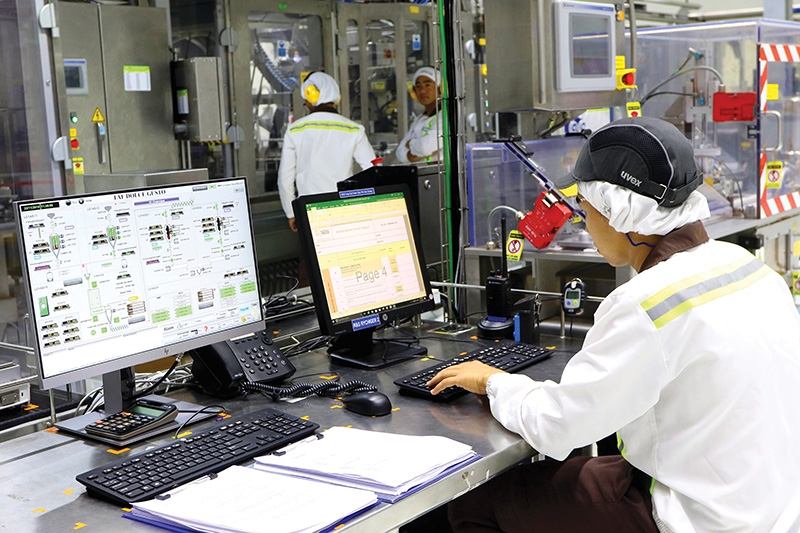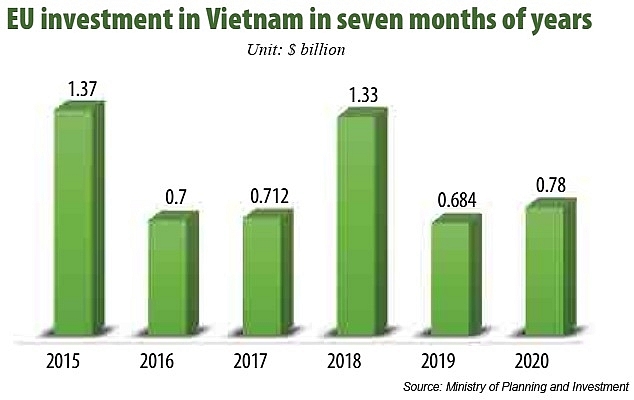EU roundtable to offer insights into the EVFTA’s benefits
 |
| Investment has been most prominent in manufacturing, electricity, and real estate, however, the EVFTA might boost other sectors too. Photo: Le Toan |
The Italian Chamber of Commerce in Vietnam (ICHAM) recently was forced to cancel working trips to Shanghai to consult Italian investors there on their expansion plans to Vietnam. The cancellation was just one of many among EU businesses and other foreign investors during a tumultuous 2020.
“In the global health crisis, Italian investors find that they should not focus their supply chains in one market, but diversify them to other markets to ease risks. And Vietnam is a target in that,” ICHAM executive director Pham Hoang Hai told VIR.
Italian businesses are among those in the EU bloc that want to restructure their global supply and value chains amid recent faults to ease the reliance on a single market. In this trend, Vietnam has an opportunity to further integrate, and the new EU-Vietnam Free Trade Agreement (EVFTA) is expected to lend a helping hand.
To this end, the Delegation of the European Union to Vietnam in association with the European Chamber of Commerce in Vietnam (EuroCham) and the Vietnam Chamber of Commerce and Industry (VCCI) will organise a roundtable this week to discuss the EVFTA and how Vietnamese enterprises and the government can seize the opportunities to integrate further in the aftermath of COVID-19.
The EVFTA and EU-Vietnam Investment Protection Agreement (EVIPA) have been approved at a time when the Vietnamese government has consistently reiterated the importance of promoting sustainable economic growth after the pandemic is controlled, in which promotion of foreign direct investment (FDI), links with global supply chains, digital transformation, and development of local business – especially small- and medium-sized enterprises (SMEs) and startups – are considered to be of great importance.
 |
The pandemic has stalled moves from EU businesses to enter or expand in Vietnam in the short term, while the crisis has both short-term and far-reaching implications for the Vietnamese economy at its core, including trade, investment, businesses, and jobs. The impact is particularly strong when it comes to Vietnam’s international trade and global supply chains due to the openness of the nation’s economy.
While the pandemic continues to damage globally, some improvements in treatment, including the hopeful production of vaccines, have been seen. Thus, future preparations for a new normal are being made now in order to fully tap into the benefits.
According to EuroCham, European enterprises have been growing their investment in Vietnam for some time, and this trend is set to accelerate with the EVFTA because the deal has opened up trade in services and investment, and is providing more stable conditions for current investment. European enterprises now get privileged access to new areas in sectors ranging from higher education to environmental services and from telecommunications to maritime transport.
EuroCham chairman Nicolas Audier said, “We anticipate that European investment will continue to rise over the course of the agreement’s decade-long implementation period.”
| To support businesses’ recovery, EuroCham suggests the government consider a rescue package to make much-needed credit available to companies hit hard by COVID-19. They include: - 50 per cent reduction of corporate income tax incurred in the 2020 financial year for all enterprises in all impacted industries. The supporting policy should not be limited to small- and medium-sized enterprises as many large enterprises are also heavily affected; - 50 per cent reduction of personal income tax for all Vietnam tax residents for revenue incurred in the 2020 financial year; - 50 per cent VAT reduction in the 2020 financial year to stimulate demand and consumption, supporting economic and social recovery; and - 50 per cent reduction of compulsory social security contributions incurred in the 2020 financial year for all impacted subjects. |
Despite the issues that 2020 is throwing up, the picture of EU investment in Vietnam is moving in a positive direction. For instance, the country has recently seen a number of pharmaceutical firms from the EU make expansions amid a break in global supply chains, with Novartis and Sanofi being among the key players. It is said that pharmacy will be one of the biggest beneficiaries within the new EVFTA landscape.
EuroCham now has over 1,000 members in Vietnam, with EU investors active in 18 economic sectors and in 52 out of the 63 cities and provinces in the country. Investment has thus far been most traditionally prominent in manufacturing, electricity, and real estate.
In the first seven months of 2020, the Southeast Asian country welcomed over $780 million worth of EU investment. However, it remains modest compared to $6.41 billion from Singapore, $2.82 billion from South Korea, and $1.6 billion million from Japan. This picture will further brighten in the months to come if and when the pandemic is controlled.
The EVFTA is also a major advantage for Vietnam over tougher regional competition in the race to attract EU investment. More of that means more advanced technology, and more quality services and products for the country as a whole.
The deal will also boost bilateral trade to a new high, with Vietnamese exports to the EU forecast to rise by 42.7 per cent by 2025. The EU single market for goods consists of around half a billion consumers and 22.5 million SMEs.
The deal also enables Vietnam to improve its legal framework on par with international practices, and forces domestic businesses to increase capacity and encourage them to partner with EU partners to access the international market, thus strengthening the links between Vietnamese and European companies.
As expected, following the first roundtable, two similar events will be organised before the end of 2020. The opportunities are coming now. The important thing is how businesses and the government take actions to grasp them to increase the country’s integration into global value chains in the post-pandemic.
What the stars mean:
★ Poor ★ ★ Promising ★★★ Good ★★★★ Very good ★★★★★ Exceptional
Themes: EVFTA & EVIPA
Related Contents
Latest News
More News
- VNPAY and NAPAS deepen cooperation on digital payments (February 11, 2026 | 18:21)
- Vietnam financial markets on the rise amid tailwinds (February 11, 2026 | 11:41)
- New tax incentives to benefit startups and SMEs (February 09, 2026 | 17:27)
- VIFC launches aviation finance hub to tap regional market growth (February 06, 2026 | 13:27)
- Vietnam records solid FDI performance in January (February 05, 2026 | 17:11)
- Manufacturing growth remains solid in early 2026 (February 02, 2026 | 15:28)
- EU and Vietnam elevate relations to a comprehensive strategic partnership (January 29, 2026 | 15:22)
- Vietnam to lead trade growth in ASEAN (January 29, 2026 | 15:08)
- Japanese business outlook in Vietnam turns more optimistic (January 28, 2026 | 09:54)
- Foreign leaders extend congratulations to Party General Secretary To Lam (January 25, 2026 | 10:01)

 Tag:
Tag:




















 Mobile Version
Mobile Version